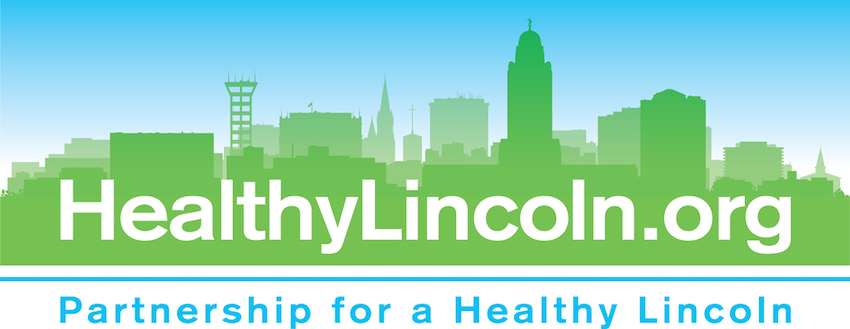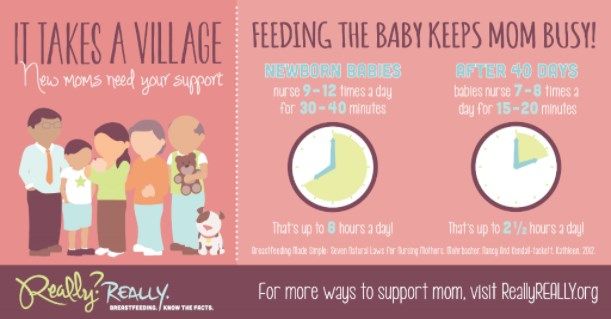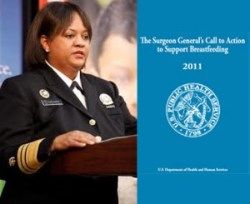Quick Links:
Recommendations Breastfeeding Facts Dads' Support of New Moms
Family Support of New Moms Local Resources/Community Breastfeeding Educators
Family, Community Encouragement Matters
If you have a family member, partner, or friend who has chosen to breastfeed, congratulations! This new mom has made a decision that will not only improve the lifelong health of the new baby in your lives, but one that improves her health as well.
A new mom’s support system – partner, family members, and friends - can play an important role in your loved one's decision to breastfeed. How does what you say and the support you give impact that decision? Local data from the two maternity care hospitals in Lincoln, reports that 91% of moms intend to breastfeed.
However, according to the 2022 Center for Disease Control and Prevention Breastfeeding Report Card, national data shows that among infants born in 2019, most (83.2%) started out receiving some breast milk. At 1 month, 78.6% were receiving any breast milk. At 6 months, 55.8% of infants received any breast milk, and 24.9% received breast milk exclusively. Statewide NPQIC (Nebraska Perinatal Quality Improvement Collaborative) breastfeeding initiation remained steady at 89% in 2024, while exclusive breastfeeding rates decreased to 62%. That implies women who choose to breastfeed are not getting the support they need to reach their individual goals.
What’s happening? Mom’s report three significant challenges to breastfeeding for the recommended duration:
- Lack of family support and encouragement
- Lack of workplace support
- Inconsistent or sparse information from healthcare providers
Why is Breastfeeding so Important?
Recommended by Medical Experts
In 2011, the US Surgeon General issued a national Call to Action to Support Breastfeeding. This report recommends widespread community efforts to create a supportive environment for new mothers in order to increase breastfeeding rates and improve the health of the nation. Because of the health benefits, the American Academy of Pediatrics and the American Academy of Family Physicians were joined in February 2016 by the American College of Obstetricians and Gynecologists in recommending babies be exclusively breastfed for the first 6 months, with continued breastfeeding as complementary foods are introduced through the infant’s first year of life or longer as mutually desired by mother and infant.
Breastfeeding Facts - From the US Dept. of Health and Human Services, Women's Health Office
Breastfeeding saves lives and reduces risk for medical conditions.
Recent research shows that if 90% of families breastfed exclusively for 6 months, nearly 1,000 deaths among infants could be prevented. Benefits for baby include reduced risk of SIDS, ear infections, upper respiratory infections, childhood leukemia, obesity, diabetes, gastrointestinal issues, asthma and more. Benefits for mom include reduced risk of breast cancer, ovarian cancer, type II diabetes, and postpartum depression.
Breastfeeding means healthier babies and fewer missed days of work.
Since babies who are breastfeed are healthier, mothers who breastfeed miss less work to care for sick infants than mothers who feed their infants formula. For dads and partners, who take time off to care for sick infants, there are fewer missed workdays as well. For emergency caregivers including grandparents, other family members, and friends, that means fewer days caring for a child who is sick.
Breastfeeding saves money.
The United States would save $2.2 billion per year in medical care. Costs are lower for fully breastfed infants than never-breastfed infants. Breastfed infants usually need fewer sick care visits, prescriptions, and hospitalizations.
Breastfeeding is better for the environment.
Formula cans and bottle supplies create more trash and plastic waste. Breastmilk is a renewable resource that comes packaged and warmed.
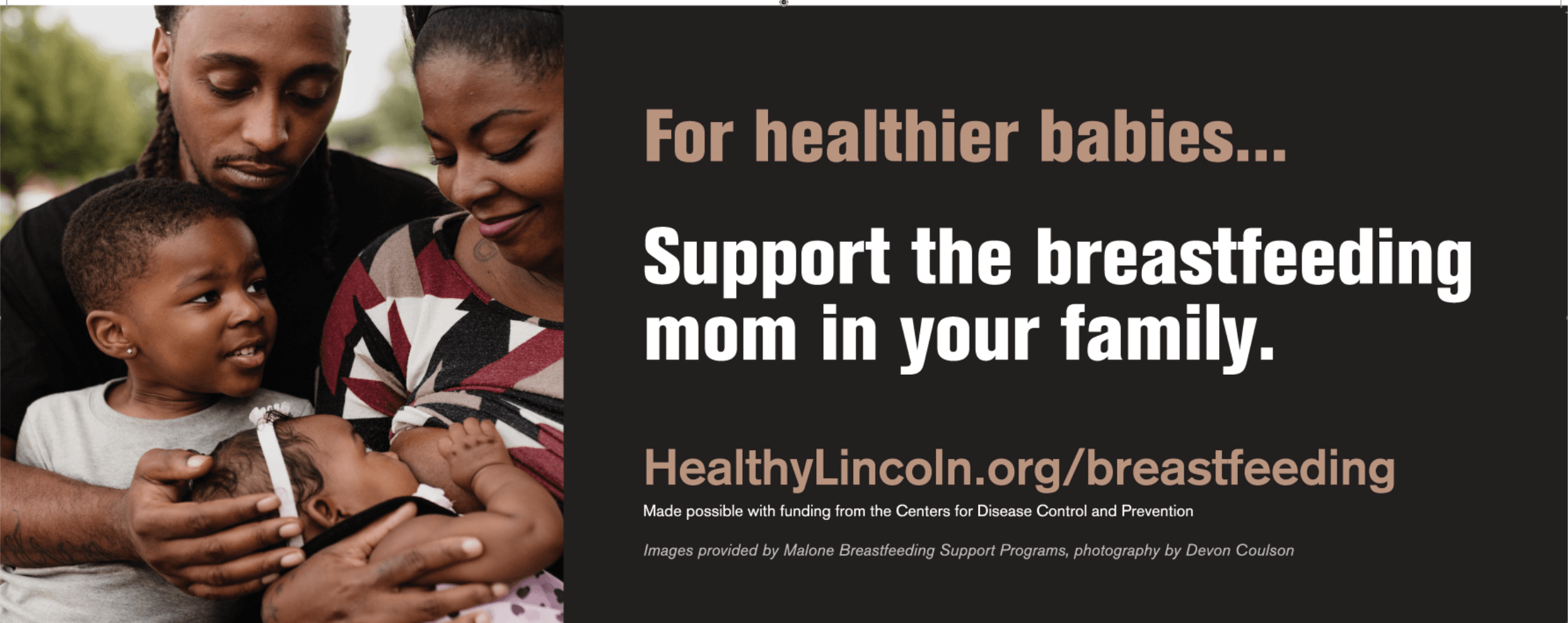
Dads - How You Can Help
Breastfeeding is a joint decision between mothers and fathers. Talk to each other and share your questions and concerns. Learn about breastfeeding. It’s important for both of you to feel good about the decision. Beyond the health benefits for moms and babies, breastfeeding builds a close bond between mother, father and baby. Mothers need encouragement and support to breastfeed the recommended duration. Fathers can provide important emotional support - your support makes breastfeeding work. If you have questions, talk to your doctor, or a breastfeeding consultant for advice and answers. Breastfeeding is a great decision, but it's not always easy. Mom can find information if she experiences difficulties or pain with breastfeeding at this link. The following are ways dads can help support breastfeeding moms and be part of the experience:
- When mom is breastfeeding, help her feel comfortable and relaxed.
- Praise her for breastfeeding, be proud.
- Take your baby to mom for breastfeeding.
- If mom needs something while she’s breastfeeding, offer to get it for her.
- Your support can make mom feel more comfortable about breastfeeding in public. In Nebraska, moms have a right to breastfeed their babies wherever they have the right to be.
- If there are other children in the home, take care of them while mom breastfeeds.
- Help around the house, so mom can get much needed rest
- If you are caring for or feeding baby in mom's absence, learn about handling and storing breastmilk
Skin to Skin
Make time for just you and your baby. Babies need cuddles and hugs from their dads, too. Skin to skin contact helps babies and fathers bond. Researchers have found that newborns cry less and achieve a drowsy, contented state sooner when they are skin-to-skin with their dads as opposed to being in a bassinette. The father’s bare chest stabilizes the baby’s body temperature to a normal range, reduces newborn stress and helps keep the baby’s blood sugar within normal limits.
The Decision to Breastfeed When Mom Returns to Work
Nebraska laws protect the right of breastfeeding mothers to safely, privately, and sanitarily express milk at the worksite. But partner support has a significant impact on a mother's decision to continue breastfeeding when returning to work. Studies have shown that a partner's initial support of the choice to breastfeed and encouragement to use the lactation room and milk expression breaks and the mother's perception of the partner's support for baby care were significant predictors of the intention to continue to breastfeed after returning to work. If your partner’s workplace offers an opportunity to be included in return-to-work breastfeeding education or activities, participate. These studies also suggest that partner’s inclusion in this workplace education can help improve workplace breastfeeding rates.
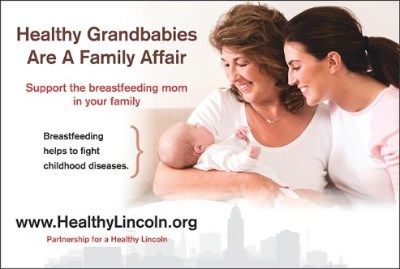
Family Members -
How You Can Help
It’s easy to support the decision of your loved one to breastfeed when you know the benefits! Breastfeeding is recommended by experts, including the American Academy of Pediatrics. Recent research shows that if 90% of families breastfed exclusively for 6 months, nearly 1,000 deaths among infants could be prevented. Benefits for baby include reduced risk of SIDS, ear infections, upper respiratory infections, childhood leukemia, obesity, diabetes, gastrointestinal issues, asthma and more. Benefits for mom include reduced risk of breast cancer, ovarian cancer, type II diabetes, and postpartum depression.
The Decision to Breastfeed When Mom Returns to Work – Family Support
Since babies who are breastfeed are healthier, mothers who breastfeed miss less work to care for sick infants than mothers who feed their infants formula. For emergency caregivers including grandparents, other family members, and friends, that means fewer days caring for a child who is sick. Encourage your loved one to continue breastfeeding even after returning to work. Nebraska laws protect the right of breastfeeding mothers to safely, privately, and sanitarily express milk at the worksite.
Show Your Support
Mothers need encouragement and support to breastfeed the recommended duration. Mom’s report one of the three significant challenges to breastfeeding for the recommended duration includes lack of family support and encouragement. Recent local data from the two maternity care hospitals in Lincoln, reports that 91% of moms intend to breastfeed. However, according to the Centers for Disease Control and Prevention, only 46% of Nebraska infants were still breastfeeding at 6 months of age, and less than 26% were breastfeeding at 1 year of age. That implies women who choose to breastfeed are not getting the support they need to reach their individual goals.
Ways to Help
- Praise mom’s choice to breastfeed. Encourage her if she gets discouraged.
- Encourage her to visit with her healthcare provider and/or a breastfeeding consultant if she has questions, concerns, or difficulties. Mom can find information if she experiences difficulties or pain with breastfeeding at this link.
- Your support can make mom feel more comfortable about breastfeeding in public. In Nebraska, moms have a right to breastfeed their babies wherever they have the right to be.
- Encourage her partner and other family members to be supportive
- If there are other children, help with childcare when possible to give mom some much needed rest
- Offer to help with household tasks
- Grandparents' guide to help breastfeeding daughters
- If you are caring for baby in mom's absence, learn about handling and storing breastmilk
Local Community Resources
MilkWorks - MilkWorks is a non-profit, community breastfeeding center with offices in Lincoln, and Omaha, Nebraska. Under the medical direction of Kathy Leeper, MD, IBCLC the center provides a wide range of education, support and clinical services to help mothers breastfeed their babies. No mother is denied services based upon ability to pay. MilkWorks also provides oversight, mentoring, training, and support for the Community Breastfeeding Educators (CBEs). Currently, 37 CBEs offer peer counseling in 27 languages. Download a CBE brochure.
LLCHD - WIC - The Women, Infant, and Children program (WIC), part of the Lincoln Lancaster County Health Department, provides nutrition and health services, and breastfeeding information and support families with low to moderate income. The program also has peer counselors to support breastfeeding and postpartum women in English and Spanish.
LLCHD Family Connects Program Family Connects is a universal newborn home visiting program in Lincoln-Lancaster County that provides a home visit by a Registered Nurse following your hospital stay. Nurses listen and answer questions and provide support and resources for families to get their children off to a healthy start. All families with a newborn who live in Lancaster County are eligible for a Family Connects visit. Nurse visits occur 3 weeks after baby is born and provide education and guidance about topics relevant to all newborns and maternal needs, including breastfeeding and postpartum support. Home visitation services are provided in the home or at another location in the community.
Family Services – WIC - Family Services Women, Infants, and Children Nutrition Program provides free food, nutrition information, and breastfeeding support to help keep pregnant women, infants and children under five healthy and strong for families with low to moderate income. The also have peer counselors to support breastfeeding and postpartum women in English and Spanish.
Nebraska Breastfeeding Coalition - The Nebraska Breastfeeding Coalition (NBC) is a network of individual members and organizational partners dedicated to improving the health of Nebraskans by making breastfeeding the norm through education, advocacy and collaboration. The coalition works together to share information and partner in activities to increase breastfeeding rates across the state. Visitors to their website can also search for the location of a lactation consultant nearest them.
Malone Community Center - The Malone Center serves Black, Indigenous and other families of color through a variety of services and outreach. Malone’s Melanin Mommas Support Group, Melanin Dads and Partners Support Group and Breastfeeding Peer Counseling programs include emotional support, lactation assistance, patient advocacy, education, virtual support, 1:1 support in the home and office, delivery of essential supplies, and group events to develop a strong support network for women and families. They also offer a variety of breastfeeding education courses, taught 1:1 or in group settings led by an International Board Certified Lactation Consultant.
Asian Community and Cultural Center - The Asian Center provides services and programs serving immigrant and refugee families in Lincoln. The center has onsite Community Breastfeeding Educators and provides breastfeeding education and information in several languages for mothers and families new to America from Asian, African, and Middle eastern countries at the center, within their community or homes of the families they serve.
El Centro de las Americas - El Centro provides services in the areas of education, family support, youth empowerment, health, and resource navigation for Lincoln’s Hispanic/Latino community. The center has an onsite Community Breastfeeding Educator and provides breastfeeding education and information in English and Spanish at the center and within the community or homes of the families they serve. Informacion de Amamantar en Espanol.
Lincoln Family Medicine Center - Lincoln Family Medicine provides a wide range of acute, chronic, and preventive medical care including (1) Prenatal care through Birth and Postpartum (2) Childhood through Adolescent , and (3) Adulthood to End-of-life Care. The center has an onsite Community Breastfeeding Educator and provides breastfeeding education and information in English and Spanish at the center.
Breastfeeding FAQs - Answers to commonly asked questions.
